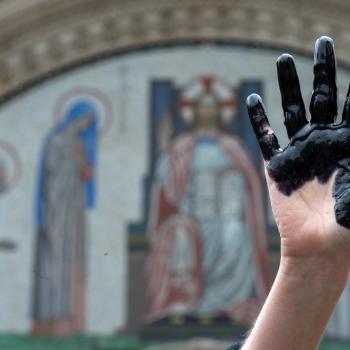
One of the things the Christian faith teaches us is that we are in this together, that we must not look out solely for our own good, ignoring the needs of others. The story of Cain and Abel, in part, shows the spirit of individualism and where it leads. For Cain has no care or concern for his brother; indeed, he is willing to kill his bother for his own gain. In the end, he suffers the consequences of his indifference, as he finds himself an exile, despised by the rest of society. Our interdependent relationship with each other indicates that if we truly desire what is good for ourselves, we should desire what is good for others, for together we are able to be better than when we are apart. This is why the common good must be maintained, because when it is rejected, though a few might be able to build themselves up in some fashion in its demise, as a whole, everyone will suffer in one fashion or another.
The more we try to take from others, building ourselves up standing, as it were, on their backs, on their sweat and tears, the more we might seem to have made ourselves greater and happier, but also, the more burden we will bear for the evil which we have done. Likewise, we will suffer that much more when everything falls apart (as Cain did once he suffered the consequences of his sin). Since we will have hurt those who could and would otherwise help us when we are in need, we will find ourselves alone, dealing with the after-effects of our actions all by ourselves. The more we fall down, the harder it will be to get ourselves back up.
Pavel Florensky pointed out the more we help ach other, the more we give of ourselves to others, the more we not only build up the common good, but the more we find ourselves following Christ, who became incarnate to give us what we need. Moreover, he suggested that by giving ourselves in this fashion, we further connect ourselves to the world, incarnating ourselves, as it were, similar to Christ:
‘It is better to give than take’. This doesn’t just apply to social relationships, but to the whole world: the line of activity in the world is the source of consciousness and understanding, and without it comes dreams and they always die. A person closed in his subjective sphere, without an influx of nourishment, is slowly falling asleep, even as his dreams fade away. Incarnation is the foundational commandment of life. Incarnation, that is the realization of one’s possibility in the world, the acceptance of the world into oneself and the formulation of matter by itself. Only with Incarnation can we verify our truth and worth, otherwise it is impossible to critique oneself soberly.[1]
When we try to cut ourselves off from each other, ignoring the needs of each other, we will find that we will lose our connection to the common good, losing out in the way it can and should help us with our needs. Individualism, as it denies our interdependent relationship with each other, gives us a promise it cannot keep, because it is based upon a lie. Individualism, as it were, would have us cut off our foot and put it on top of our head, suggesting by doing so, we will be made taller.
Contra individualism, our relationship with each other, our inner connection with each other, means we should treat each other with love. We should not be prideful, thinking ourselves greater than everyone else, and so look down upon others as being our inferiors, and so not worthy our love. We are connected together. We share human nature with each other, a nature which we all equally possesses and so make us equal to each other. If we ignore this, if we, rather, follow the lies of individualism, and so try to build ourselves up all by ourselves, cutting ourselves from others, we will limit ourselves and what we can accomplish.
We must always bear each other’s burdens, looking at each other with love. When we find people who have hurt themselves by cutting themselves off from the common good, we should try to avoid prideful thoughts which make us think of ourselves as better than them, but rather realize we could become just like them if we are not careful. And so we must help them, realizing our interdependent relationship with them means that we must even bear the burden of their mistakes:
Bear ye one another’s burdens [Gal. 6:2]. How often it happens that, seeing the error or weakness of your brother, you count yourself better than him, you condemn him while you mourn in your heart his lack of wisdom. Meanwhile, if you do in fact see truly, then you must lay this onto your own conscience as well. The visible iniquity of your neighbor is also your own iniquity if you are not preoccupied with conquering it, and it will be required of you at the Final Judgment, as if it were your own iniquity [cf. Lk. 12:48]. We must have a merciful heart, we must hurt for and not judge the other. [2]
If we see someone who has done some evil, bearing their burden means we should treat them with love, helping them to overcome that evil. We should do so in all charity and compassion, and not with a judgmental spirit:
And if he sees any fault in anyone, he ought to heal it with love and tears, and apply remedies with compassion as he would to his own self, not tyrannically and with a haughty mind, inflated with the authority which he holds, whether it be spiritual or physical, whether it be over his family or his servants. [3]
Of course, the interdependent relationship we have with each other suggests we should engage others, not only with compassion, but wisdom, recognizing that if what we would do to correct or stop someone from doing some evil would produce a greater evil, we might have to stand back and let others be free to do as they wish:
The ruin of one’s neighbor can be permitted at some point, when he is prepared for an evil and the other man does not intend to sin but only to permit one’s sin by not removing the occasion, lest many would be committed, so that the permission would impede a greater evil.[4]
This is why we must be careful and not presume those who, in some position of authority, would give others freedom to engage some evil, some sin, are necessarily supportive of that sin; often, they do not agree with it, but find that any response to stop it will make things worse, and so, concerned with the common good, will permit what they disagree with, knowing such freedom ultimately produce a better result.
Engaging the common good, engaging our interdependent relationship with each other, not only means we have a responsibility to each other, but to the common good. We must act with wisdom, doing what we can to best promote the common good. For if the common good is diminished, everyone suffers, as there will be less good for all of us to receive. Against the ideology of individualism, as presented by Cain, we must accept that we are responsible for each other and do the best we can to fulfill it.
[1] Pavel Florensky, Letters from the Gulag. Trans. Adela Lawless (No City: Independently Published, 2020), 266. [To Olyen, Aug. 25, 1936].
[2] Sergius Bulgakov. Spiritual Biography. Trans. Mark Roosien and Roberto J. De La Noval (Brooklyn, NY: Angelico Press, 2022), 92-3, [1/14.XI.1924].
[3] Roberta Ervine, trans., The Blessing of Blessings: Gregory of Narek’s Commentary on the Song of Songs (Kalamazoo, MI: Cistercian Publications, 2007), 200.
[4] St. Alphonsus Liguori, Moral Theology. Volume I: Books I – III On Conscience, Law, Sin and Virtue. Trans. Ryan Grant (Post Falls, ID: Mediatrix Press, 2017), 589 [Quoting from Busembaum’s Moral Theology, which is the source and foundation for Alphonsus’ work, as Alphonsus’ work often acts as a commentary to it].
Stay in touch! Like A Little Bit of Nothing on Facebook.
If you liked what you read, please consider sharing it with your friends and family!













